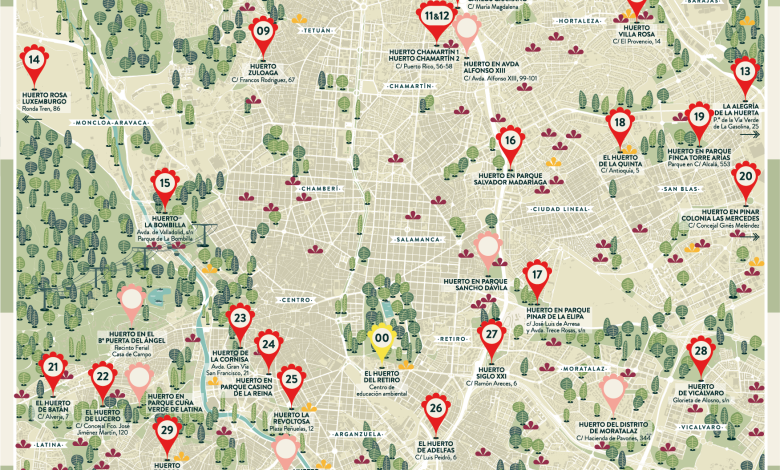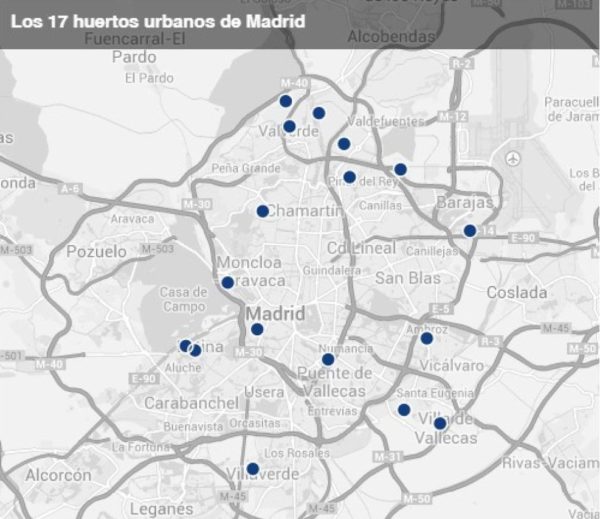Regulations of the Madrid City Council for Urban Gardens

On September 30, 2014, the Madrid City Council approved the call for the granting procedure for the occupation of plots of public domain in Madrid for the use of community urban gardens.
The object of the same is the authorization of the exclusive and free use for two years, extendable to another two upon request, of municipal plots classified as a green area for use as an urban garden, to non-profit associations, in order to satisfy environmental, social-community, educational and landscape functions. In this article I have briefly summarized the document from the Official Gazette of the Madrid City Council that sets out what the granting process will be like.
CHARACTERISTICS OF THE HORTICULTURE PROJECTS TO BE DEVELOPED
Urban horticulture projects are conceived as public spaces dedicated to carrying out various activities related to environmental education, the promotion of community relations, the cultivation of horticultural plants for self-consumption and gardening by the residents of the municipality of Madrid. In this sense, the cultivation of the orchard must be carried out under the premises of organic farming. Likewise, the furniture for common activities, such as benches, tables, etc. must be integrated into the landscape as a whole. In addition, to guarantee efficiency and savings in water consumption, the irrigation of the orchards will not exceed 0.978 m3 /m2 of cultivated land per year. The plots will be delivered with abasic conditioning that allows the start of the project such as work on compacted land, topsoil and manure, perimeter fencing with access, information panel, connection and installation of a manhole for automated irrigation and a storage shed.
The project must justify the need to have a plot to carry out:
1.-Social and community functions linked to the garden.
2.-Environmental functions.
3.-Educational function, using the orchards as a tool.
4.-Function of promoting health and the therapeutic effects of the organic garden.
5.-Integrating function of specific groups (disabled, unemployed, elderly…).
6.-Productive function linked to self-consumption.
7.-Landscaping function through the recovery of degraded spaces.
The occupation is free and will not be subject to the rate of private use or special use of public domain assets, since it does not entail an economic activity, since the product obtained from these orchards will not be used for sale.
Who can apply for garden plots?
Legally constituted entities and associations that are registered in the Register of Citizen Entities of the Madrid City Council, accrediting their social, pedagogical, therapeutic or environmental, non-profit character, and having their headquarters within the municipal term, may make applications. from Madrid.
ASSESSMENT CRITERIA
The projects will be assessed according to the following evaluation scale, up to a maximum of 25 points:
A) Project activities (up to 15 points):
1. Evaluation of the project objectives (up to 7 points): one point for the inclusion of objectives and activities designed to fulfill each of the 7 functions described above.
2. Number of recipients affected by the project (up to 5 points)
– More than 50: 5 points
– 40 – 50: 4 points
– 30 – 39: 3 points
– 20 – 29: 2 points
– 10-19: 1 point
3. Adequacy of the rules of internal operation to fulfill the functions (1 point) and effectiveness of the planned communication and dissemination system (1 point).
4. Having carried out activities related to those planned to be carried out (1 point).
B) Design of the physical space of the plot and the organization of the activity (up to 10 points):
1. Adequacy of the organization of the space to fulfill the functions (2 points) and design that favors the biological control of pests and diseases (2 points)
2. Measures for proper waste management and composting (2 points) and an efficient irrigation system (2 points) in addition to those set forth in the «Good practices and standards applicable to the use of community organic urban gardens»
3. Use of materials that allow a landscape-integrated aesthetic (1 point) and the use of materials that respect the environment (1 point)
EVALUATION AND RESOLUTION COMMISSION FOR THE CONCESSION OF ORCHARDS
The Committee for the assessment and monitoring of urban gardens will evaluate the applications received and propose for authorization those that have obtained the highest score. In addition, it will supervise compliance with the «Good practices and regulations applicable to the use of community ecological urban gardens» and will prepare an annual report on the gardens.
The person in charge of granting the authorization is the Delegate of the Government Area for the Environment and Mobility, who will publish the resolution within a maximum period of 6 months.

OBLIGATIONS OF THE BENEFICIARIES OF THE ORCHARDS
The beneficiary entity will be obliged to:
- Exclusive horticultural and social-community use.
- Do not carry out activities for profit on the premises or assign its use to third parties
- Do not carry out any type of commercial advertising in the space, except by municipal authorization.
- Allow free access for people interested in visiting the orchard and participating in the activities carried out.
- Space maintenance.
- Correctly preserve and return all the elements provided by the City Council in optimal conditions.
- Do not cause inconvenience to the neighborhood.
- Guarantee the safety of people who travel to the place, without the City Council being responsible for any type of accident that could occur.
- To bear the expenses of the consumption of water for irrigation, as well as the expenses derived from the contracted personnel, if applicable.
- Take out a civil liability insurance policy, which covers any damage and/or loss that may be caused during the entire period of occupation, and up to an amount of 150,000 euros.
- Communicate to the Madrid City Council any incident that may arise.
- Comply with good practices and established standards
CAUSES OF CANCELLATION OF THE AUTHORIZATION OF USE OF THE SPACE
- Resignation by the entity
- Disappearance of the beneficiary association
- Non-compliance with good practices, rules and conditions of use established or those that the Madrid City Council may dictate at any time
- Substantial modification of the objectives of the statutes of the association or entity.
- Inactivity in the orchard for a period of six months.
In addition, the authorizations may be annulled directly by the Madrid City Council at any time for reasons of public interest, without the right to compensation.
At the end of the authorization, the plots must be left free, within a period of one month from the date of completion, without the need for communication by the City Council.
What do you think of this initiative? I’ll be waiting for your answers!

![Photo of Differences between powdery mildew and mildew: [Effects, Propagation and Treatments]](https://www.complete-gardening.com/wp-content/uploads/2022/08/differences-between-powdery-mildew-and-mildew-effects-propagation-and-treatments-390x220.jpg)


